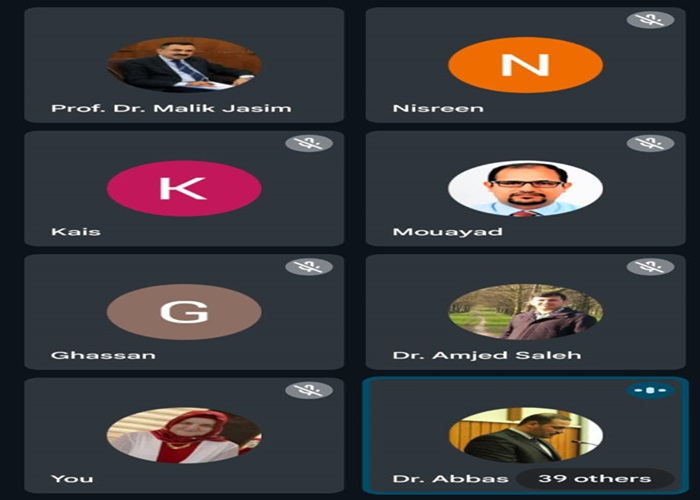The Dean of the College of Engineering at Kirkuk University, Prof. Dr. Jalnak Akram Omar, participated in the first meeting of the Deans of Engineering Colleges Committee in Iraqi universities for the academic year 2024-2025 via the “Google Meet” electronic platform, on Saturday, 10-19-2024. The meeting was attended by all deans of engineering colleges in Iraq from various universities, in addition to a number of academic officials from the Ministry of Higher Education and Scientific Research.
Meeting agenda:
1. The recommendations and decisions of the previous meeting were reviewed, as progress was followed up in the areas of updating curricula and developing teaching capabilities.
2. The attendees discussed the universities’ plans to establish new engineering departments in response to technical developments and the needs of the local and global market. The importance of this establishment was emphasized in enhancing job opportunities for graduates and developing academic cadres in new engineering fields such as renewable energy and artificial intelligence.
3. The importance of updating and developing engineering curricula in line with global technological developments was discussed. The introduction of curricula that enhance students' skills in the fields of programming and modern technology was discussed, in addition to focusing on practical education and graduation projects that address industrial problems in Iraq.
4. Research efforts in engineering colleges were reviewed, as the deans discussed the available ways to enhance research cooperation between Iraqi universities. The challenges facing scientific research were also reviewed and how to overcome them by strengthening partnerships with international research institutions and providing the necessary support to researchers.
5. The meeting discussed the importance of cooperation between engineering colleges and local and international industrial companies, with the aim of linking education outcomes to the needs of the labor market. It was proposed to organize joint seminars and workshops to enhance this cooperation and to provide training opportunities for students.
6. Plans to improve the infrastructure in colleges were discussed, including equipping laboratories and developing research and educational facilities to ensure an ideal educational environment.
Meeting decisions:
1. Agree to form subcommittees to follow up on the implementation of recommendations for the establishment of new departments.
2. Set a timetable for updating curricula in cooperation with the relevant authorities.
3. Strengthen communication with the private sector to create training and cooperative programs for students and graduates.
The meeting concluded with everyone stressing the importance of continuing periodic meetings via electronic platforms to achieve the desired academic goals and activate communication mechanisms between universities in academic and research fields.

 College of Engineering - University of Kirkuk
College of Engineering - University of Kirkuk  Arabic
Arabic  English
English 